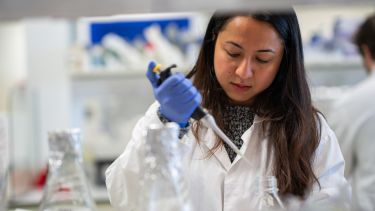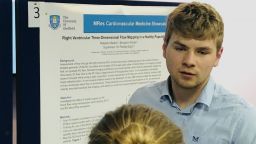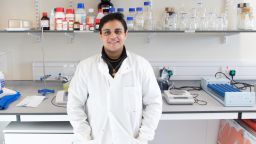Explore this course:
Applications for 2024 entry are now open. Apply now or register your interest to hear about postgraduate study and events at the University of Sheffield.
Cardiovascular Medicine
School of Medicine and Population Health,
Faculty of Health

Course description
Lead academic: Dr Victoria Ridger
This course is designed to give you the skills and expertise to develop new diagnostic tools and treatments for cardiovascular problems that affect populations around the world. Topics range from the fundamental molecular and cellular biology to the care that patients receive.
You will study a range of conditions in detail, including coronary artery disease, cardiopulmonary disease, heart valve disease and heart failure – their causes, their effects and the treatments available for patients. You will also learn about imaging tools such as MRI, CT and ultrasound, a range of lab-based and computational modelling techniques, and how these are used to help researchers understand cardiovascular conditions and inform the decisions that clinicians make.
You will have the opportunity to visit the Cardiac Catheter Suite at the Northern General Hospital. The course also covers the process of developing new drugs, devices and treatments for patients with cardiovascular conditions. You will examine the economics of medical technologies, how they are regulated and how they can be adopted, and get the opportunity to pitch your own idea to help patients with cardiovascular disease.
You will also complete a research skills training programme and, after all other teaching has been completed, you will spend 20 weeks working full-time on your own research project. Working as part of a team of professional scientists, you will have the opportunity to test a hypothesis, design experiments, analyse your results and present your findings. Many of our students have published their work in peer-reviewed journals and presented their findings at conferences.
Example research projects
A range of research project topics are available each year. Projects completed by previous students include:
- Modelling blood flow to improve the management of coronary artery disease.
-
Supervisor: Professor Julian Gunn
In order to develop an accurate model of blood flow in patients with coronary artery disease (CAD), you will
- learn about decision-making in the management of CAD
- learn about the physiology of coronary blood flow in health and disease, including fractional flow reserve (FFR)
- familiarise yourself with our VIRTUheart model of virtual (computed) FFR
- work on improving the accuracy of the model
We have a wealth of clinical data (angiograms and measured FFRs) in our research archive (ArQ). You will have full access to these data and will be able to process the angiograms in the VIRTUheart software and produce your own measures of virtual FFR for your individual project. This will include aspects such as investigating the effect of branched vessels, diffuse disease, chronic occlusions, grafts, vascular distensibility, myocardial ischaemic burden, acute coronary syndromes and 'virtual' stunting.
You will be taught about coronary anatomy, angiography, angioplasty, bypass surgery, image processing, using software tools, data analysis and report writing. - Serological and imaging biomarkers in the assessment of right ventricular failure in pulmonary arterial hypertension.
-
Supervisor: Dr Andy Swift
Pulmonary arterial hypertension is a severe disease associated with poor outcomes due to failure of the right ventricle. Reliable monitoring of the right ventricle and identification of right ventricular failure is crucial to delivering the optimal therapeutic approach.
Specific serological biomarkers have been identified as useful prognostic markers particularly at follow-up, strongly predicting all-cause mortality. In addition, several novel serological biomarkers are emerging with great potential for both diagnosis and prognosis in PAH. Magnetic resonance imaging is considered the gold standard test for the evaluation of the right ventricle.
The ambition of this research is to determine the clinical value of serological biomarkers and compare them with MRI in patients with PAH. This study will include exposure to lab-based and clinically applied research; the student will be required to develop core lab skills coupled with competency in cardiopulmonary MRI analysis.
- The role of a novel inflammatory macrophage marker in human immunity responses.
-
Supervisor: Dr Heather Wilson
In the artery wall, macrophages play an important role in driving atherosclerosis, by taking up lipids and forming the necrotic lipid core that builds plaque deposition. Macrophages show plasticity between different states or phenotypes, according to their functions in the inflammatory response to infection; clearing pathogens, and in the resolution and repair response following injury or infection.
In order to analyse how macrophages change within diseased arteries, we discovered a novel membrane protein marker for the inflammatory phenotype.
This project will build our understanding of the function of this novel membrane protein. We hypothesise that this protein is involved in the inflammatory macrophage response to lipid uptake, phagocytosis and pathogen sensing. You will perform siRNA knockdown of this protein in human monocyte-derived macrophages, to assess its role in phagocytosis, pathogen clearance and lipid loading.
- Investigating the role of filamin A in pulmonary arterial hypertension
-
Supervisor: Dr Allan Lawrie
Cytoskeletal proteins that bind to actin to cross-link actin filaments, and can also act as a protein scaffold for numerous protein partners. Mutations in specific cytoskeletal proteins are associated with severe arterial abnormalities, and through whole genome sequencing, we have recently identified causal mutations in patients with Idiopathic Pulmonary Arterial Hypertension (IPAH). How these mutations link to the molecular and cellular pathogenesis of IPAH is unknown.
You will investigate the expression and function of these genes in pulmonary artery smooth muscle cells and endothelial cells from patients with IPAH and controls as well as lung tissue from rodent models and post-transplant heart and lungs.
- Investigation into the effects of ticagrelor on plasma adenosine levels
-
Supervisor: Professor Rob Storey
The PLATO study demonstrated that ticagrelor, a platelet P2Y12 receptor antagonist, reduced mortality in patients with acute coronary syndromes (ACS) compared to standard therapy with clopidogrel.
While it is well established that ticagrelor results in higher and less variable platelet P2Y12 inhibition than clopidogrel, it is hypothesised that the observed effect on mortality rates may relate to additional effects of ticagrelor. These off-target effects of ticagrelor may be attributable to its ability to selectively inhibit adenosine uptake by erythrocytes via equilibrative nucleosidase transporter 1 (ENT1) and inhibit platelet-expressed ENT1. Inhibition of ENT1 may result in increased plasma adenosine levels.
Studies looking at plasma adenosine levels following ticagrelor therapy have shown conflicting results; an increase in plasma adenosine has been observed in patients with ACS and peripheral vascular disease but a study in healthy volunteers and a study carried out in Sheffield in patients undergoing elective coronary artery stenting have shown no effect.
This research project will obtain additional information on the effect of ticagrelor on plasma adenosine levels and identify potential explanations for the discrepancies observed between clinical studies.
- Hemodynamics of stents and effects on vascular healing
-
Supervisor: Professor Paul Evans
Stents alter local flow patterns which have major effects on inflammation, vascular dysfunction and restenosis.
To understand the molecular mechanisms linking flow to vascular function, you will use state-of-the-art cell culture and molecular biology techniques to elucidate the effects of flow on coronary artery endothelial function. This will include the use of unbiased microarray/RNAseq omics approaches coupled with gene silencing technology to assess the function of flow-sensitive genes.
The project will equip you with modern molecular techniques that are required for postgraduate molecular medicine research at the PhD level.
- Computer modelling in treatment management of patients with aortic valve stenosis
-
Supervisor: Norman Briffa
Aortic valve stenosis is the most common valvular disease in the UK and its prevalence is rising with an ageing population. Symptomatic patients have a poor prognosis and the only effective treatment is aortic valve replacement (AVR). This can be performed during open heart surgery or in certain cases using transcatheter techniques.
Symptomatic and haemodynamic improvement (decrease in gradient and myocardial work) after AVR is dependent on several factors including the size and type of the implanted prosthesis and function of the left ventricle. Computer modelling and artificial intelligence (AI) are increasingly being used in medicine to help physicians make diagnoses and/or choose appropriate treatments.
Using a computer model that was developed by the Eurvalve project, we hope to predict the degree of change in haemodynamics, cardiac work and symptoms that will occur after AVR. Validation will take place using data from patients who already have received their treatment and the model will be used prospectively in 20 patients with aortic stenosis undergoing treatment.
- The role of RNA editing in the pathogenesis of pulmonary arterial hypertensionitle
-
Supervisor: Dr Roger Thompson
Pulmonary arterial hypertension (PAH) is a devastating disease characterized by vascular remodelling that leads to increased resistance in the pulmonary circulation, right heart failure and premature death.
The bone morphogenetic protein (BMP) signalling pathway is strongly implicated in disease susceptibility, with mutations in the BMPR2 gene found in approximately 15% of patients with the idiopathic disease and over 70% of patients with the heritable form of the disease. Reduced BMPR2 signalling in the absence of mutations has been widely reported in patient cells and tissue and in animal models of pulmonary hypertension, but how signalling is suppressed in this context remains unclear.
RNA editing is a post-transcriptional modification that promotes transcriptional diversity across tissues and can alter protein translation, stability, structure or function. Compelling evidence has emerged to implicate adenosine-to-inosine (A-to-I) RNA editing in vascular biology by ADAR1, the master regulator of A-to-I editing in vascular cells; however, the roles of these pathways have not been examined in PAH. The goal of this project is to determine whether ADAR1 regulates pulmonary vascular remodelling.
- Four-dimensional flow cardiovascular magnetic resonance imaging (4D flow CMR) for precision medicine
-
Supervisor: Dr Pankaj Garg
We have several themed projects which involve cutting-edge 4D flow technology to improve diagnosis and guide therapy in cardiac disease. The projects involve enhanced evaluation of valvular heart disease, heart failure and pulmonary hypertension using 4D flow CMR. Sheffield is uniquely positioned to offer these opportunities as we have a high computational lab at the Imaging Sciences lab located in POLARIS.
This project will equip the students with the following skills:
- Advanced critical insight into cardiovascular physiology using imaging-based methods.
- Segmentation of heart MRI for deriving physiologically relevant functional and tissue characterisation parameters.
- Understanding of software solutions for heart MRI analysis.
- IT skills including collaborative writing, handling referencing software, visualisation and curation of large datasets.
The student will be expected to publish at least two papers from this project under the supervision of Dr P Garg and Dr A Swift. They will be encouraged to present their findings at national/international conferences.
Do you have a question? Talk to us
Book a 15-minute online meeting with our course tutor to find out more information and ask further questions.
Modules
The course begins with four core modules that cover the fundamentals of cardiovascular disease and research skills. You'll then choose from a selection of projects associated with a particular vascular disease.
- Research Skills
-
This module aims to develop your skills in information literacy, oral presentation, scientific writing, critical analysis, data analysis, statistics, ethics, research integrity and basic laboratory techniques. These are all skills that support subsequent modules, the laboratory project and dissertation writing, and are also transferable skills useful in many future careers.
15 credits
The module consists of lectures, tutorials, active (interactive) teaching and group work, followed by taster sessions in various different laboratory techniques. - Vascular Cell Biology
-
This module explores the molecular mechanisms underlying cardiovascular disease and introduces the students to basic knowledge on which the following module is based. The module builds upon the research in the Department of Cardiovascular Science, exploring the cellular mechanisms, molecules and signalling pathways involved in the pathology of vascular diseases.
15 credits
The module incorporates a laboratory experience; students will gain hands-on experience of cell biology methods that we use to understand vascular biology function. There is a strong emphasis on using experimental approaches to test hypotheses and an ability to apply background knowledge to assess experimental results. - Vascular Disease: models & clinical practice
-
This module builds on the basic cellular and molecular principles learnt in the previous module (CDL401). The module examines the value of in vivo model systems in testing hypotheses and the development of classical and emerging therapies is explored.
15 credits
The module also examines how basic science is translated into clinical practise and therapy. The module covers global epidemiology, drug treatment and clinical intervention and considers relevant ethical issues. Students will have the opportunity to visit the cardiovascular and cardiology clinical departments, clinical research facility and to observe a current clinical interventional technique. - Cardiovascular Imaging
-
This module explores the role of imaging techniques in the diagnosis and management of cardiovascular disorders. The student will be introduced to different imaging modalities and will examine the relative merits of each and how they are applied in specific clinical scenarios. The students will gain hands on experience in the acquisition and interpretation of imaging, which will include visits to the Sheffield Teaching Hospital imaging suite and the academic unit of radiology. They will also begin to explore the role of in-silico modelling in maximizing data that can be gained from standard imaging through practical experimentation.
15 credits
By the end of the module the student will be able to understand the role of cardiovascular imaging in the diagnosis and management of common cardiovascular conditions, describe the relative merits of various imaging modalities (ultrasound, CT, MRI, nuclear imaging) in terms of their clinical and practical application, understand the role of in silico modelling in maximising data that can obtained from standard imaging techniques and understand the current limitations in cardiovascular imaging and discuss potential areas of future research. - Research Project
-
The aim of the module is to provide the opportunity to learn and apply research methods to test a specific scientific hypothesis using the knowledge gained in the previous taught modules of the course (CDL601 and CDL602). A list of projects will be made available and students will be asked to select their top choices. Having been assigned a project of their choice, the students will carry out a 30 week research project, culminating in an oral presentation and dissertation detailing their research and placing their work within a greater scientific context. Students will be expected to join in with the departmental seminars, research group meetings, journal clubs and supervisor meetings, to learn and experience the role of a scientific researcher, by undertaking laboratory or literature based research.
120 credits
The content of our courses is reviewed annually to make sure it's up-to-date and relevant. Individual modules are occasionally updated or withdrawn. This is in response to discoveries through our world-leading research; funding changes; professional accreditation requirements; student or employer feedback; outcomes of reviews; and variations in staff or student numbers. In the event of any change we'll consult and inform students in good time and take reasonable steps to minimise disruption.
Open days
An open day gives you the best opportunity to hear first-hand from our current students and staff about our courses.
Find out what makes us special at our next online open day on Wednesday 17 April 2024.
You may also be able to pre-book a department visit as part of a campus tour.Open days and campus tours
Duration
1 year full-time
Teaching
You will be taught through lectures, seminars, tutorials, practical classes, visits to clinical facilities, independent study and your research project.
Assessment
You will be assessed through written assignments, posters and presentations. The research project is also assessed through a dissertation.
Your career
This course is great preparation for a career in cardiovascular medicine research. Many of our graduates go on to complete a PhD and work at top universities and research institutes. Others have pursued a career as a clinical scientist with the NHS or have returned to their clinical studies.
Student profiles
Entry requirements
You'll need at least a 2:1 in a relevant science undergraduate degree. A 2:2 may be considered with a strong performance in research-related modules.
We also welcome medical graduates, as well as UK medical undergraduates wishing to intercalate. Find out more on the Medical School website.
Overall IELTS score of 7.0 with a minimum of 6.5 in each component, or equivalent.
If you have any questions about entry requirements, please contact the department.
Fees and funding
Apply
You can apply now using our Postgraduate Online Application Form. It's a quick and easy process.
More information
We can link you with our current students to ask about their experiences of postgraduate study at Sheffield and our graduates are often available during open days.
Any supervisors and research areas listed are indicative and may change before the start of the course.
Recognition of professional qualifications: from 1 January 2021, in order to have any UK professional qualifications recognised for work in an EU country across a number of regulated and other professions you need to apply to the host country for recognition. Read information from the UK government and the EU Regulated Professions Database.



